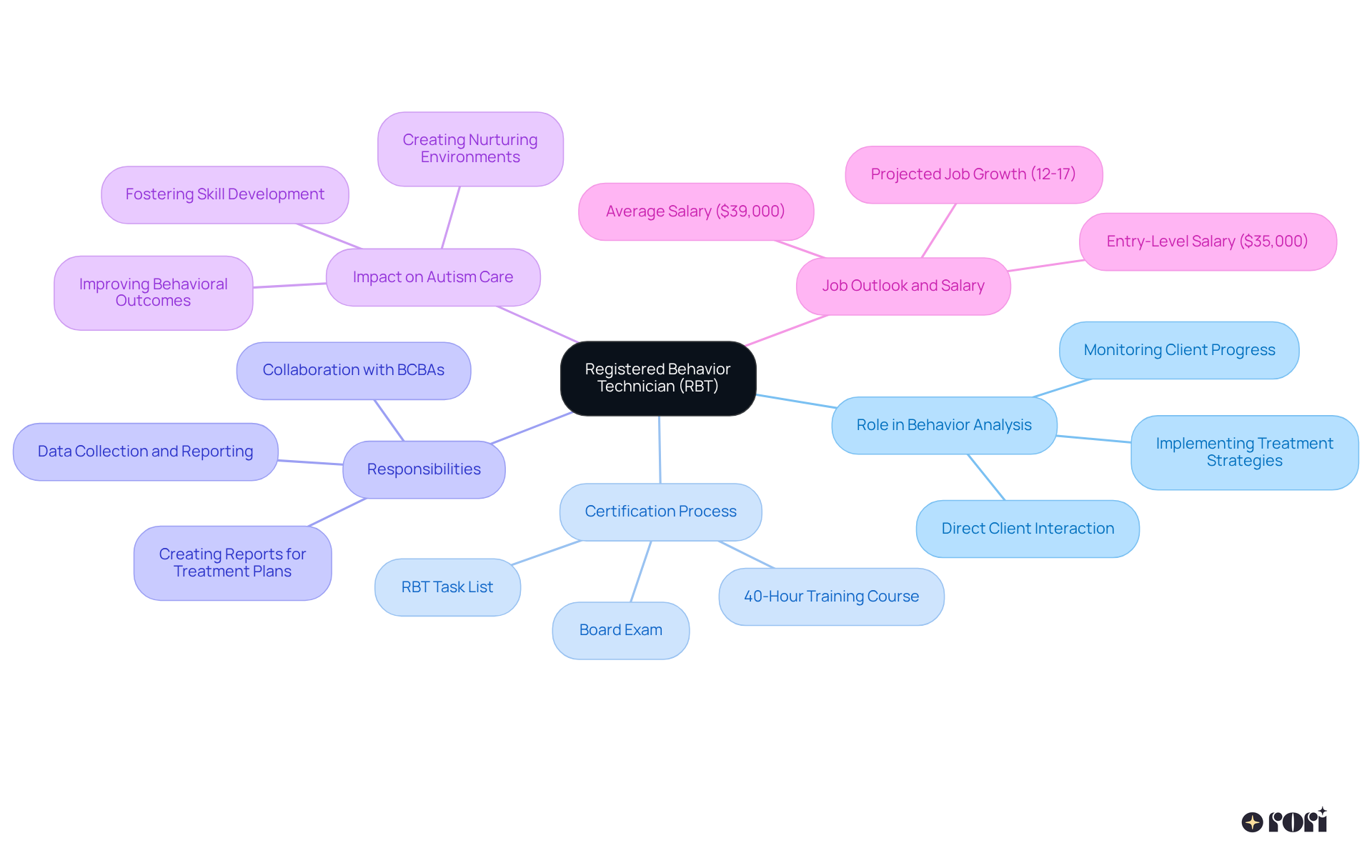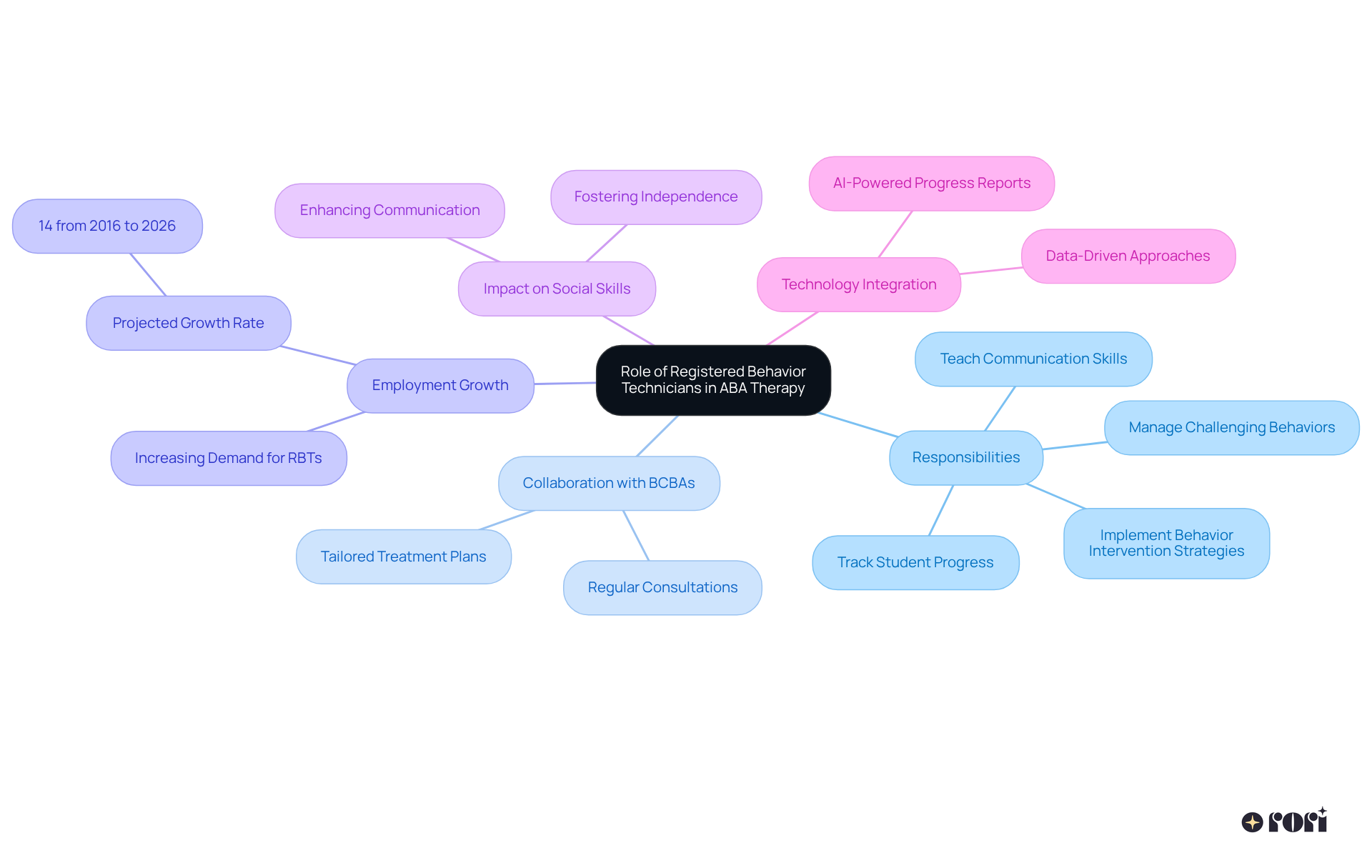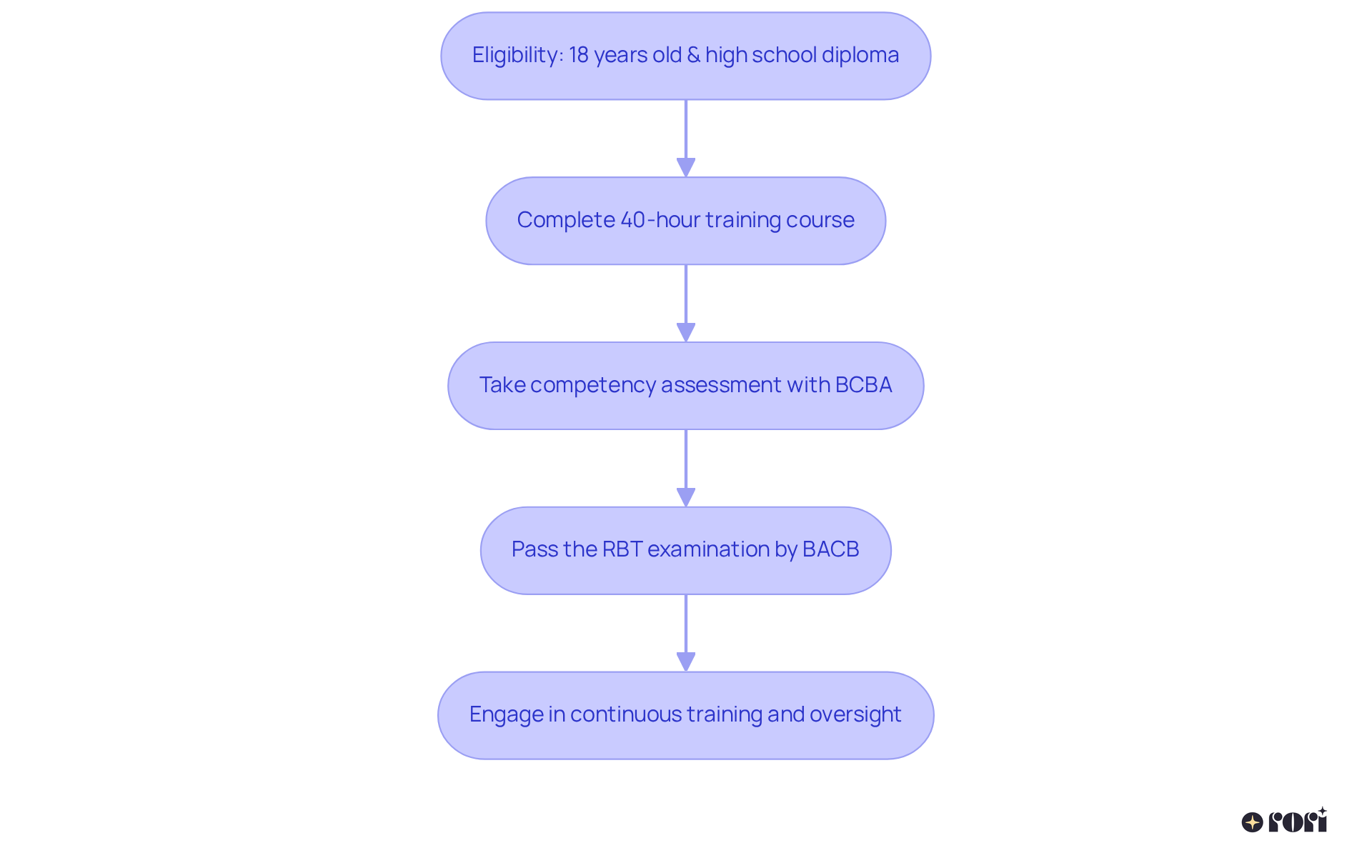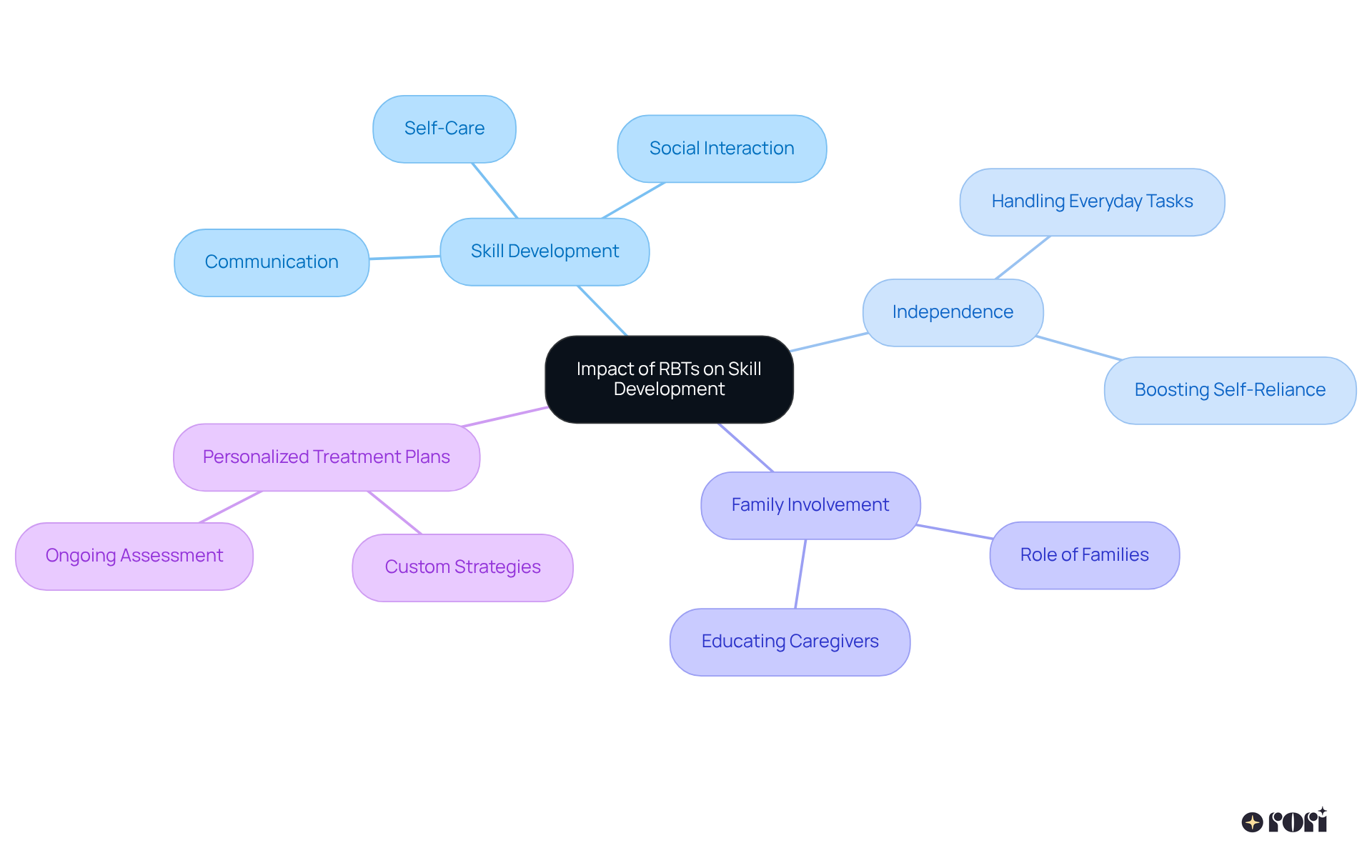The RBT acronym stands for Registered Behavior Technician, a vital role in autism care. RBTs implement treatment strategies designed by Board-Certified Behavior Analysts to support children with autism. This role is essential in enhancing behavioral outcomes and fostering independence through evidence-based interventions.
Moreover, the article sheds light on the certification process for RBTs and the increasing demand for their skills in the field of Applied Behavior Analysis (ABA) therapy. It’s exciting to see how these dedicated professionals are making a real difference! Let’s explore this together and understand how RBTs can support your child’s journey.
The role of Registered Behavior Technicians (RBTs) is becoming increasingly vital in the world of autism care. Their hands-on support plays a crucial part in how effective treatment strategies can be. These dedicated professionals not only implement evidence-based methods but also create nurturing environments that help children with autism develop skills and gain independence.
As the demand for skilled RBTs rises, so does the challenge of ensuring that they are properly trained to meet the unique needs of each child. What does it take to become an RBT? And how do they truly impact the lives of those they serve? Let’s explore this together! We’re here to help you every step of the way!
The role of a Registered Behavior Technician, commonly referred to as the RBT acronym, is crucial in the field of behavior analysis, particularly in supporting children with autism. These dedicated professionals work hand-in-hand with kids, implementing treatment strategies crafted by Board-Certified Analysts. Their hands-on support is crucial for making sure these strategies are applied consistently and effectively.
To become a certified RBT acronym, candidates must pass a board exam that evaluates their understanding of the RBT Task List. This list outlines the essential skills and understanding required to practice effectively. But the role of registered behavior technicians goes beyond just following a checklist; they bridge the gap between theory and real-life application in Applied Behavior Analysis (ABA) therapy.
By providing evidence-based methods, RBTs play a significant part in improving autism care. They help foster better behavioral outcomes and skill development in young ones. Experts highlight how behavior technicians create a warm and nurturing environment for children with autism, enhancing their engagement and learning through personalized interventions.
Let’s explore this together! The journey of supporting children with autism is filled with challenges, but with the right help, we can make a real difference.

Certified Technicians play a crucial role in the success of ABA therapy, providing vital one-on-one support to children with autism. They implement behavior intervention strategies, carefully track each student's progress, and are essential in fostering social skills and independence. By collaborating closely with Board Certified Behavior Analysts (BCBAs), RBTs ensure that treatment plans are tailored to meet the unique needs of every child.
In their daily interactions, these dedicated professionals teach important communication skills, reinforce positive behaviors, and effectively manage challenging behaviors through structured interventions. This hands-on approach is not only key to significant progress in a young person’s development but also aligns with the growing demand for skilled professionals in the field.
Did you know that, according to the Bureau of Labor Statistics, employment of registered behavior technicians is projected to grow by 14% from 2016 to 2026? This reflects the increasing need for personnel who can provide direct support for individuals with autism. Research also shows that behavior therapists significantly enhance social skills in individuals with autism, leading to better interactions and relationships.
Their impact is profound, as they help children navigate social situations, ultimately promoting greater independence and improving quality of life. The ongoing shortage of skilled ABA therapists highlights the importance of behavior technicians in meeting the needs of youth with autism. This is particularly significant considering the financial impact of Autism Spectrum Disorder (ASD) in the U.S., which is projected to cost between $61 billion and $66 billion each year.
Moreover, with the integration of AI-powered progress report automation through our behavior care engine, which conducts functional behavior analysis and generates automatic reports for clinician assessment, registered behavior technicians can now devote 50% more time to direct treatment for children. This technology not only streamlines the process but also empowers caregivers with essential ABA principles and strategies, enhancing their involvement in supporting children's behavioral goals.
It’s also important to note that RBTs, which is the RBT acronym, must pass a board exam to obtain certification, ensuring they are well-equipped to provide effective support. Let’s explore this together! We’re here to help you every step of the way!

Becoming a Registered Technician (RBT) is an exciting journey! To get started, there are a few eligibility requirements and steps you need to follow.
Once you’re certified, it’s important to keep growing in your role. Registered behavior technicians are required to engage in continuous training and oversight to maintain their credentials. This helps you stay updated on the latest best practices in Applied Behavior Analysis (ABA) therapy, ensuring you’re always at the top of your game. Let’s explore this together—your journey in this rewarding field is just beginning!

Certified Behavior Technicians play a vital role in helping children with autism, ADHD, and learning disabilities become more independent and enhance their abilities through Applied Behavior Analysis (ABA) therapy. By using evidence-based methods, these dedicated professionals support the development of essential life skills like communication, social interaction, and self-care. For instance, through structured play and targeted social skills training, children can learn to express their needs, form friendships, and navigate various social situations. Did you know that kids receiving ABA therapy, often provided by registered behavior technicians, show impressive improvements in social skills and communication? In fact, there's an over 89% success rate in enhancing adaptive behaviors!
Moreover, behavior technicians help foster independence by teaching children how to handle everyday tasks, which boosts their self-reliance and confidence. The ongoing support and encouragement from these technicians are crucial in helping young individuals reach their full potential. By working closely with families and therapists, they ensure that each child's unique needs are met, leading to better outcomes in social skills and overall independence. Plus, the RBT acronym represents professionals who continually assess and adjust behavioral plans based on individual progress, ensuring that interventions remain effective and tailored to personal needs.
Family involvement is so important in this journey! It not only enhances the effectiveness of therapy but also reinforces the skills learned during sessions. Educating caregivers is a key part of this process, empowering them with ABA principles and strategies that align with therapeutic goals. This active participation not only improves behavioral outcomes but also encourages informed decision-making and better support at home. Personalized treatment plans, customized to fit each child's specific needs, further boost the effectiveness of interventions under the RBT acronym, ensuring that children receive the best support possible. Let’s explore this together!

The significance of the Registered Behavior Technician (RBT) role in autism care is truly immense! These dedicated professionals are the backbone of Applied Behavior Analysis (ABA) therapy, implementing personalized strategies that help children with autism develop skills and gain independence. By connecting theoretical knowledge with real-world application, RBTs play a vital role in enhancing treatment plans and ensuring that each child receives the tailored support they need on their journey.
As we explore this further, it's clear that RBTs have a wide range of responsibilities. They deliver one-on-one interventions and collaborate closely with Board Certified Behavior Analysts (BCBAs). The certification process for RBTs ensures that these technicians are well-prepared to make a meaningful impact in the lives of children. Plus, with the integration of technology in their work, RBTs can streamline processes and dedicate more time to direct treatment, ultimately benefiting the children they serve.
Reflecting on the essential role of RBTs, it's evident that their contributions go far beyond individual interactions. They are instrumental in shaping the futures of children with autism, enhancing their quality of life and promoting independence. As the demand for skilled professionals in this field continues to rise, it’s crucial to support and advocate for the importance of RBTs. Engaging with families, empowering caregivers, and raising awareness about what RBTs do can lead to more informed decisions and better outcomes for children navigating the complexities of autism.
Let’s explore this together! By understanding the vital role of RBTs, we can all contribute to a brighter future for our children. We’re here to help you every step of the way!
What does RBT stand for?
RBT stands for Registered Behavior Technician.
What is the role of a Registered Behavior Technician?
The role of a Registered Behavior Technician is crucial in behavior analysis, particularly in supporting children with autism by implementing treatment strategies created by Board-Certified Analysts.
How do RBTs contribute to autism care?
RBTs contribute to autism care by providing hands-on support, ensuring that treatment strategies are applied consistently and effectively, and fostering better behavioral outcomes and skill development in children.
What qualifications are needed to become an RBT?
To become a certified RBT, candidates must pass a board exam that evaluates their understanding of the RBT Task List, which outlines essential skills and knowledge required for effective practice.
How do RBTs enhance the learning environment for children with autism?
RBTs enhance the learning environment by creating a warm and nurturing atmosphere, which increases engagement and promotes personalized interventions tailored to the needs of each child.
What is the importance of evidence-based methods in the work of RBTs?
Evidence-based methods are important for RBTs as they help improve autism care by ensuring that the interventions used are grounded in research and proven to be effective in fostering positive behavioral outcomes.